| Srl | Item |
| 1 |
ID:
133763
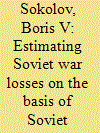

|
|
|
|
|
| Publication |
2014.
|
| Summary/Abstract |
The problem of calculating the Soviet losses in the Second World War has confronted scholars with potentially insoluble difficulties. Especially in the first year of the war, during the catastrophic defeats and disorganized retreats, individual records on Soviet military personnel were either simply not kept or were lost or destroyed. Even during the war, the Soviet government criticized the failure to keep casualty lists up to date and noted that often soldiers were killed or went missing even before they were formally added to the unit rosters. The Red Army had no equivalent to the dog tag. Many soldiers, out of superstition, refused to wear the smertniki-little wooden cases that held identification information on slips of paper-believing that a wearer was ordained to die. Official estimates to this date, however, appear plainly understated. The author proposes a new method for estimating the Soviet personnel losses in the Second World War, based on the 1939 and 1956 censuses of the Soviet population.
|
|
|
|
|
|
|
|
|
|
|
|
|
|
|
|
| 2 |
ID:
133762


|
|
|
|
|
| Publication |
2014.
|
| Summary/Abstract |
According to the official Soviet historiography, the defenders of the Brest fortress (today in Belarus) resisted the German troops who attacked on 22 June 1941, for 32 days. The Soviet soldiers would rather perish than surrender; hardly anybody would be captured. On this basis the Fortress was granted the title 'Hero-Fortress', and a huge memorial was built on the site of the battles of June 1941. The author of this article analyzed German documents concerning the daily losses in dead and wounded of the Wehrmacht and captured Red Army soldiers. He concludes that these numbers can be used as an indicator of endurance and intensity of the fighting for the Brest fortress. The conclusions differ strongly from the assertions of the official narrative.
|
|
|
|
|
|
|
|
|
|
|
|
|
|
|
|
| 3 |
ID:
133761
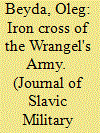

|
|
|
|
|
| Publication |
2014.
|
| Summary/Abstract |
This article is based on little-known sources and unpublished documents and traces the fates of some White Army veterans, who during WWII served in the German Army, holding a rank of sonderführer. Some of them were evacuated to Gallipoli from Crimea in November 1920 (gallipoliytsy). The topic of Nazi administration attitude toward the use of Russian emigrants on the front is also touched upon. Special attention is given to the biographies of Russian emigrant interpreters in the 9th Army of the Wehrmacht. It is concluded that the final aims and motivation of Nazis and White émigrés were different. Realization of that contradiction helps the researcher to understand why a part of Russian military emigration had chosen collaboration and joined Hitler's 'crusade against Bolshevism'.
|
|
|
|
|
|
|
|
|
|
|
|
|
|
|
|
| 4 |
ID:
133758
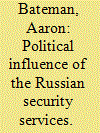

|
|
|
|
|
| Publication |
2014.
|
| Summary/Abstract |
The Komitet gosudarstvennoy bezopasnosti (KGB) has been preserved under the new names of the post-Soviet security services, particularly the Federal'naia sluzhba bezopasnosti (FSB). The continuities between the Soviet and post-Soviet security institutions, coupled with the chaos following the collapse of the Soviet Union, have produced a post-Soviet Russia that has strayed away from democracy and developed into a counterintelligence state. Former Soviet security services officers are the ruling elite in modern Russia. The post-Soviet security apparatus is one of the most influential institutions in the formation of Russia's foreign policy, and the domestic security situation in Russia directly affects its foreign policy toward the United States. The post-Soviet security apparatus has significantly influenced Russia's departure from democracy and pursuance of a hostile foreign policy toward the United States.
|
|
|
|
|
|
|
|
|
|
|
|
|
|
|
|
| 5 |
ID:
133757
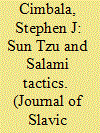

|
|
|
|
|
| Publication |
2014.
|
| Summary/Abstract |
Vladimir Putin used a composite of ancient and modern methods of military persuasion in first destabilizing, and then annexing, Crimea in February and March of 2014. Putin's use of military persuasion through Russian and proxy forces enabled him to annex Crimea and to set the stage for further imposition of Russia's will on Ukraine's eastern provinces. Russia's determination to resist excessive Westernization by Ukraine, especially the possibility of Ukrainian membership in NATO, exceeded the willingness of the U.S. and its allies to reverse Putin's gains in Crimea.
|
|
|
|
|
|
|
|
|
|
|
|
|
|
|
|
| 6 |
ID:
133760


|
|
|
|
|
| Publication |
2014.
|
| Summary/Abstract |
What constitutes a representative voice of soldiers at war can be a contentious issue, especially when dealing with a specifically identifiable group or subgroup. Based on interviews with veterans, this article argues that the oral testimony of Jewish soldiers in the Red Army is every bit as representative and useful as that of any other group of servicemen and servicewomen who served that army on the Eastern Front during the Second World War.
|
|
|
|
|
|
|
|
|
|
|
|
|
|
|
|
| 7 |
ID:
133759
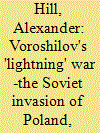

|
|
|
|
|
| Publication |
2014.
|
| Summary/Abstract |
The Soviet invasion of Poland of 17 September 1939 may not have met widespread Polish resistance, but a number of significant engagements saw the Red Army take far from insignificant losses in a rushed operation characterized by overconfidence, poor planning, and cooperation between arms and inadequate logistical support. Materials published in Russian and English since the collapse of the Soviet Union and Soviet academic hegemony over Eastern Europe now allow us to examine the Soviet conduct of the invasion in much more detail than had previously been the case. Much of the material presented here on the topic is to be included in a chapter of a monograph concerned with Soviet military effectiveness during the period of the Second World War, and comments are welcome.
|
|
|
|
|
|
|
|
|
|
|
|
|
|
|
|